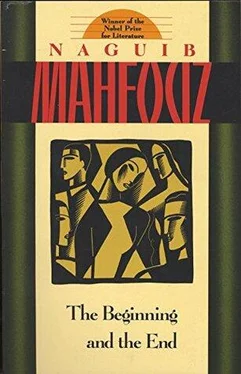Naguib Mahfouz - The Beginning and the End
Здесь есть возможность читать онлайн «Naguib Mahfouz - The Beginning and the End» весь текст электронной книги совершенно бесплатно (целиком полную версию без сокращений). В некоторых случаях можно слушать аудио, скачать через торрент в формате fb2 и присутствует краткое содержание. Год выпуска: 2016, Издательство: Anchor Books, Жанр: Классическая проза, на английском языке. Описание произведения, (предисловие) а так же отзывы посетителей доступны на портале библиотеки ЛибКат.
- Название:The Beginning and the End
- Автор:
- Издательство:Anchor Books
- Жанр:
- Год:2016
- ISBN:нет данных
- Рейтинг книги:4 / 5. Голосов: 1
-
Избранное:Добавить в избранное
- Отзывы:
-
Ваша оценка:
- 80
- 1
- 2
- 3
- 4
- 5
The Beginning and the End: краткое содержание, описание и аннотация
Предлагаем к чтению аннотацию, описание, краткое содержание или предисловие (зависит от того, что написал сам автор книги «The Beginning and the End»). Если вы не нашли необходимую информацию о книге — напишите в комментариях, мы постараемся отыскать её.
The Beginning and the End — читать онлайн бесплатно полную книгу (весь текст) целиком
Ниже представлен текст книги, разбитый по страницам. Система сохранения места последней прочитанной страницы, позволяет с удобством читать онлайн бесплатно книгу «The Beginning and the End», без необходимости каждый раз заново искать на чём Вы остановились. Поставьте закладку, и сможете в любой момент перейти на страницу, на которой закончили чтение.
Интервал:
Закладка:
Seeking in his last letter to ingratiate himself more firmly with his brother, Hassanein mentioned at the close that his new jacket lost its attractiveness when worn with his thin, shabby trousers. Would it be possible, he inquired, for Hussein to come up with the price of new trousers over the next three months? Hussein paused thoughtfully, uncertain as to whether he could comply with his brother’s request without jeopardizing his own savings. Yet he already knew that hesitation was futile, for he could not fail to respond to any appeal from Hassanein. Had he been at home with his brother he might have scolded him. But the distance separating them softened his heart and made his longing for his family irresistible. His devotion to careful economizing made him dislike squandering his money. But in the interest of sacrifices for his family, he found it only a little difficult to relax his carefulness. To please Hassanein, it would do him no serious harm if he tightened his belt for another three months. Knowing his brother well, Hussein realized that Hassanein thought that the others had an obligation to be kind and helpful to him, and that if Hussein failed to buy him the trousers, he would indignantly forget the real favor of buying him the jacket. Furthermore, he was driven by a mysterious urge to shower his brother with favors and good turns, for he believed there was a dazzling future in store for this young man. He had sacrificed his own career for the sake of Hassanein and his sacrifice should be complete. Again, with a mixture of sadness and delight, he saw himself as a sacrificial goat, patient and stoical in facing the grim fate of his family, shielding them from its blows. This feeling gave him strength and pleasure and lent a superb moral significance to his life.
Then the unexpected happened, or so he thought, since he was not quite frank with himself. One day as he sat conversing with Hassan Effendi, the man asked him, “Haven’t you thought of marriage?”
The young man became confused and a bit frightened. “No,” he muttered.
The man raised his eyebrows in disapproval. “Then what are you thinking of?” he asked. “Why do you live? Do you think that a man, especially after securing a job, has any end in life other than marriage?”
Hussein hesitated for a moment. “I have other responsibilities which demand priority,” he said.
He proceeded to confide to the man the difficult circumstances of his family, sometimes exaggerating them to strengthen his position. The man listened with interest until he finished, but he did not appear to be convinced. He was not prepared to be convinced of anything that got in the way of realizing his hopes. He shook his bald head with indifference.
“I see that you are exaggerating the seriousness of the situation,” he said. “Just be patient until your brother obtains the baccalaureate. Then you’ll be free from your obligations, and he, in turn, will have to find a job for himself. Nahas Pasha himself got married. Do you think that your responsibilities outweigh his?”
Confused, Hussein laughed. “But my brother is determined to continue his education,” he said.
“Listen,” the man continued. “If you have goals in life such as the restoration of the 1923 Constitution, for example, it would be better for you to put off your marriage! You must marry at the end of this year, as soon as your brother finds a job. But if he insists on completing his education, your mother, who approves his plan, has no right to object to your marriage. She has no right to pamper one son if it means depriving the other of his elemental rights in life.”
Hussein was affected but not convinced by the man’s remarks. Because he wanted to maintain their friendly relations, Hussein did not contradict him. “I believe it should be possible to realize my hopes without destroying those of my brother,” he said.
On the surface, this conversation about marriage appeared to be rambling and haphazard. Yet there was a tacit agreement between them about its purpose, for it had been preceded by earlier hints in their conversations every evening. As if dissatisfied with this implicit degree of agreement, Hussein, with much shyness, said frankly, “I think Miss Ihsan is still young.”
The man laughed aloud. “Ihsan is young, of course,” he said. “But marriage isn’t meant just for adults.”
Hussein’s situation remained unchanged in the days that followed, until Hassan Effendi offered to introduce him to some of his relatives at a family party, and he readily accepted. He was ashamed to appear in his shabby clothes before the girl’s relatives. Something akin to madness, as he would call it later, seized him. Driven by this capricious passion, he ordered a new tailored suit, to be paid for in installments, and bought a new pair of shoes and a tarbush. On the first day of the month, he realized that it was impossible to send any money to his mother.
Instead of the money, he sent her false excuses. He told her that he had fallen ill and that the price of the medicines he had bought was beyond his limited means. He wrote the letter with a lifeless hand and depressed heart, convinced at the bottom of his soul that he was making a series of blunders and that they had deprived him of mental balance and sound judgment; so much so that he failed to fabricate a more adequate excuse.
FIFTY-THREE
It was Thursday. Hussein was lying in bed reading the morning paper, which he usually laid aside until the afternoon. Hearing a knock on the door, he thought it was Hassan Effendi’s servant. Going to the door to open it, he found himself face to face with his mother! His mouth agape, he took her hand between his.
“Mother, in Tanta! I can hardly believe my eyes!” he exclaimed.
Pressing his mother’s hands, he kissed her cheeks; or rather, they exchanged a kiss. Turning back into the room, he asked her with surprise, “Why didn’t Hassanein tell me you were coming so that I could meet you at the station?”
She took the chair he offered her.
“I found little difficulty finding where you live,” the mother said with a smile. “It’s much more difficult to find the way to a house in Shubra itself! Hassanein suggested that I wait until he could write and tell you of my coming. But I saw no reason to disturb you in your illness. In the meantime, I couldn’t stay in Cairo knowing that you are here both lonely and ill.”
At the sound of the word “ill,” he awoke from the ecstasy of their meeting, a depressing fear gripping his heart. But with his potent fear came a similarly potent power to combat it.
“Mother,” he said, “I’m sorry I’ve disturbed you. But I didn’t expect this happy result, your coming in person.”
Her face overflowing with kindness and compassion, she examined him carefully. “What’s wrong with you, my son?” she asked. “How are you now? Tell me about your illness.”
He exerted his utmost to hide his confusion so that it would leave no traces on his face. He was sure he didn’t look like a sick man. In fact, with a better diet, his health had improved since his appointment to government service.
“Nothing serious,” he said simply. “I had a bad intestinal upset. It only lasted one day and part of another.”
“We were all very worried about you, especially as you had reassured us about your health in your previous letter,” she said, fixing her eyes on him. She paused. “Good God!” she continued. “We thought there must be something seriously wrong with you if you weren’t able to send us any money this month.”
He felt her words pricking him like a sharp needle. With a faint smile on his face, he hurried to say, “I had to spend more than two pounds for a doctor and some medicines. And as you know, I don’t have any reserve for such emergencies!”
Читать дальшеИнтервал:
Закладка:
Похожие книги на «The Beginning and the End»
Представляем Вашему вниманию похожие книги на «The Beginning and the End» списком для выбора. Мы отобрали схожую по названию и смыслу литературу в надежде предоставить читателям больше вариантов отыскать новые, интересные, ещё непрочитанные произведения.
Обсуждение, отзывы о книге «The Beginning and the End» и просто собственные мнения читателей. Оставьте ваши комментарии, напишите, что Вы думаете о произведении, его смысле или главных героях. Укажите что конкретно понравилось, а что нет, и почему Вы так считаете.












